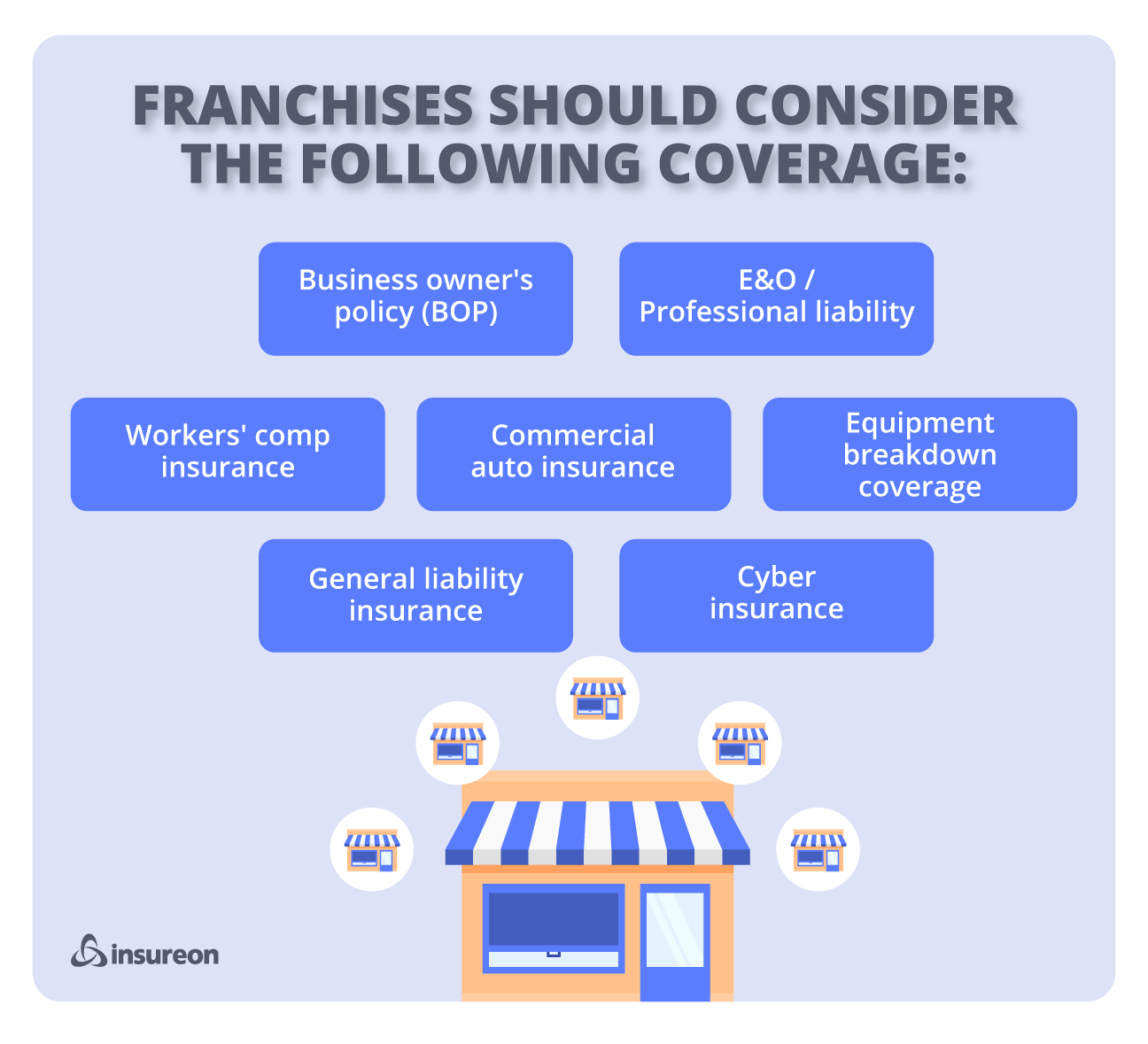
Why do franchises need insurance?
Your franchise agreement might outline insurance requirements, but that's not all the protection you need. From workers' comp to general liability, insurance coverage helps you comply with state laws and rental agreements. It also defends your business against costly accidents and injuries.
What types of business insurance do franchises need?
These insurance coverage solutions provide a protection plan for the most common risks faced by franchisees.
Business owner's policy
A BOP bundles general liability coverage and commercial property insurance at a discount. It secures protection against the most common lawsuits and business property damage.
- Customer accidents
- Stolen or damaged business property
- Business interruption incidents
General liability insurance
General liability insurance covers the cost of third-party accidents, such as a customer who trips and suffers an injury at your franchise. It may be required in your franchise agreement.
- Slip-and-fall accidents
- Accidents that damage customer property
- Libel and other advertising injuries
Workers’ compensation insurance
Workers’ comp shields franchises from work-related medical bills that health insurance might deny. Most states require this coverage as soon as a small business hires its first employee.
- Work-related medical expenses
- Disability benefits
- Lawsuits from employee injuries
Errors and omissions insurance
E&O insurance protects franchises from legal costs related to mistakes, oversights, and missed deadlines. It's sometimes referred to as professional liability insurance.
- Errors that cause a client to lose money
- Accusations of negligence
- Missed deadlines
Commercial auto insurance
A commercial auto policy covers costs when a franchise's vehicle is involved in an accident. Each state has its own requirements for auto liability insurance.
- Auto accident injuries
- Property damage caused by your vehicle
- Vehicle theft and vandalism
Cyber insurance
Cyber liability insurance helps franchises recover financially from data breaches and cyberattacks. It's strongly recommended for any small business that stores personal information.
- Data breach notification costs
- Data breach investigations
- PR costs for reputational harm
How much does business insurance cost for franchises?

Factors that affect your franchise insurance premium include your profession, number of employees, profitability, and the policy's limits and deductible.
Here are the average costs for top insurance policies sold by Insureon:
General liability insurance: $42 per month
E&O/Professional liability: $61 per month
Workers' comp: $45 per month
Franchises and other small businesses can often qualify for discounts on business insurance.
Verified business insurance reviews
Hear from customers like you who purchased small business insurance.
State insurance requirements
Find business insurance requirements in your state


Common questions about franchise business insurance
Get answers to FAQs about franchise insurance.
Why is insurance important for franchises?
Insurance is crucial for franchises, LLCs, sole proprietors, independent contractors, and other business models. Insurance can help your franchise when:
You need insurance to sign a franchise agreement or a lease. Your franchisor or landlord may require you to carry insurance to protect themselves against potential losses. These requirements should be outlined in the franchise disclosure document (FDD) or lease agreement. In some cases, they may ask you to list them as an additional insured on your policy.
You need insurance coverage to comply with the law. Depending on the laws in your state, you may need coverage for a business-owned vehicle, to obtain a license in your field, or to protect against work-related injuries.
You want to gain your customers' trust by being insured. Even when it's not required, carrying insurance is a sign of professionalism and financial stability. It helps attract customers and can give individual franchisees an edge over their competitors.
You want to safeguard your own business from catastrophic losses. 43% of small businesses have faced or been threatened with a lawsuit, but they often lack the resources that larger companies draw upon to survive a legal battle. Insurance helps your franchise withstand unexpected costs from customer injuries, fires, and other incidents that could devastate an otherwise successful business.
How do I get a certificate of insurance?
Insureon can help provide your franchise with the right insurance program to meet all of your business needs, which includes providing a certificate of insurance (COI) to allow you to sign a lease or your franchise agreement.
With Insureon, you can get usually get a COI on the same day that you apply for quotes. It’s a simple three-step process:
- Fill out our easy online application.
- Compare free quotes from top-rated insurance companies.
- Buy a policy and download a certificate of insurance.
A certificate of insurance will outline the details of your insurance, such as policy limits, deductibles, and any endorsements. It serves as proof of insurance for clients, landlords, lenders, and anyone else who asks whether your business is insured.
How can I save money on business insurance for a franchise?
Insurance pricing is usually affordable for small, low-risk franchises, and there are a few ways to find comprehensive business coverage at an affordable price.
Most businesses can find cheaper insurance with the following methods:
Compare quotes. With Insureon, you will instantly get multiple free online quotes from leading insurance companies. Compare insurance options from different providers and consult with our agents to make sure you're not paying too much for insurance while getting what's best for your franchise.
Bundle policies. Many small business owners buy general liability coverage and commercial property insurance together in a business owner's policy, which costs less than purchasing each policy separately. It's sometimes possible to bundle additional coverages, depending on your profession.
Choose a high deductible. You can customize your insurance policy to save money, such as by choosing a higher deductible or lower policy limits.
Avoid claims. Finally, take steps to reduce your business's risks. Risk management strategies include prompt cleanup of spills, the elimination of clutter, and installation of bright lighting. These can all help you avoid vicarious liability claims, which helps keep your premiums low.
Does my type of franchise affect what type of insurance I need?
Yes, your type of franchise can affect your commercial insurance needs.
For example, restaurants and convenience stores need liquor liability insurance if they plan to serve or sell alcohol.
In some states, real estate agents and brokers are required to carry errors and omissions insurance. Plumbers and landscapers may need a general liability policy to obtain a license.
Retail stores and others involved with products should consider carrying product liability insurance. Often included in general liability insurance, this policy covers liability claims related to harm caused by a product.
Cleaning businesses may need a janitorial bond before a client will allow cleaners onto their property.
Also, computer repair stores and other tech companies should invest in tech E&O insurance to protect against their unique cyber risks.
Insureon can help customize insurance quotes to make sure your franchise gets all the coverage it needs. You can find coverage solutions today by starting an application, or by asking a licensed insurance agent.
What other types of coverage do franchises need?
The policies your business needs depend on your specific risks, such as whether you drive for work or have a client who requires a certain type of insurance.
Other coverage options to consider include:
Business interruption insurance: This policy covers financial losses if your business is forced to close temporarily due to a fire or natural disaster. It can often be added to a business owner's policy.
Hired and non-owned auto insurance (HNOA): An HNOA policy provides liability protection for a franchise where employees drive their personal vehicles, leased vehicles, or rented vehicles.
Employment practices liability insurance (EPLI): This coverage protects a franchise from claims of unfair hiring practices, discrimination, or other violations of employee rights.
Commercial umbrella insurance: Umbrella insurance covers legal expenses when the limit is reached on another liability policy, such as general liability or commercial auto insurance. Franchise owners may need this coverage to meet a franchisor's requirements for higher liability limits.
Equipment breakdown coverage: This type of insurance pays for repair or replacement of damaged machinery or equipment used by your franchise.






























